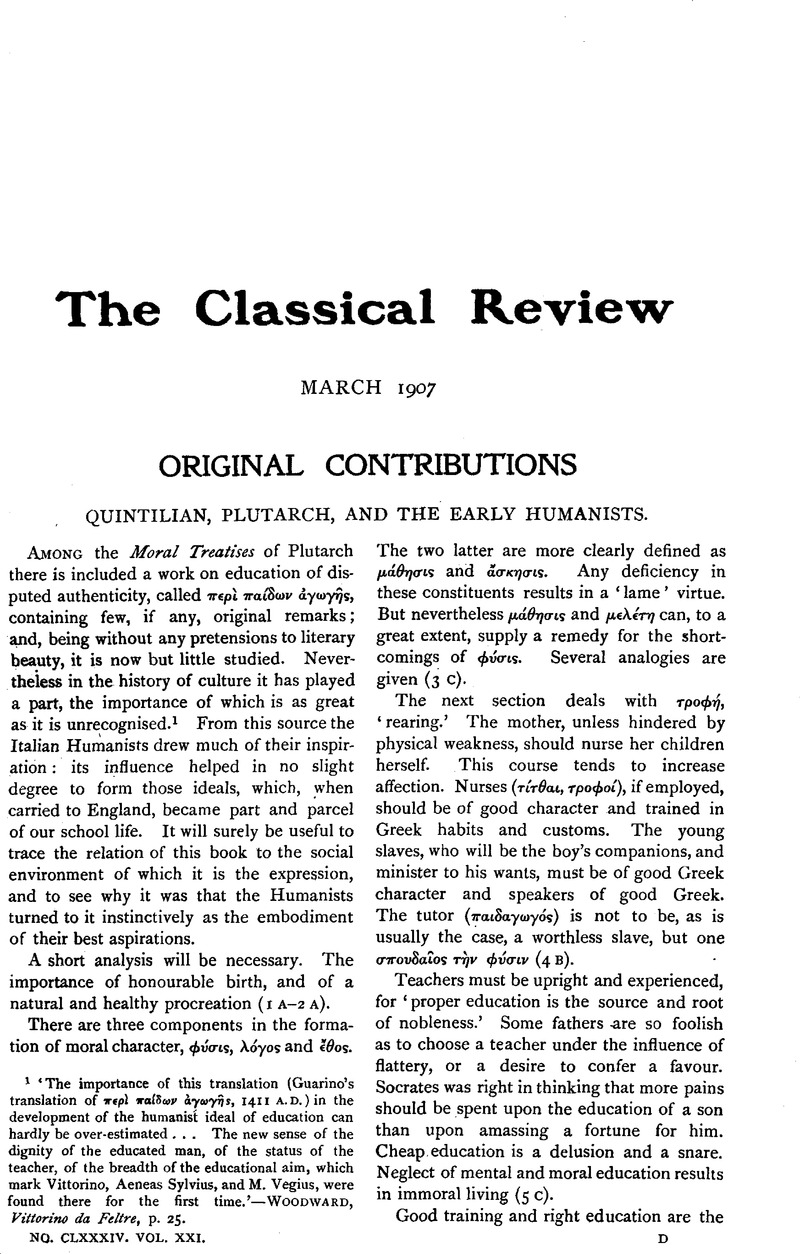Published online by Cambridge University Press: 27 October 2009

page 33 note 1 ‘The importance of this translation (Guarino's translation of ![]() , 1411 A. D.) in the development of the humanist ideal of education can hardly be over-estimated … The new sense of the dignity of the educated man, of the status of the teacher, of the breadth of the educational aim, which mark Vittorino, Aeneas Sylvius, and M. Vegius, were found there for the first time.’—Woodward, Vittorino da Feltre, p. 25.
, 1411 A. D.) in the development of the humanist ideal of education can hardly be over-estimated … The new sense of the dignity of the educated man, of the status of the teacher, of the breadth of the educational aim, which mark Vittorino, Aeneas Sylvius, and M. Vegius, were found there for the first time.’—Woodward, Vittorino da Feltre, p. 25.
page 35 note 1 ![]() 3 c–4 B; Quint. I. i. 1–9.
3 c–4 B; Quint. I. i. 1–9.
page 35 note 2 π. π. ἀγ. 4 c–5 c; Quint. II. ii. iii.
page 35 note 3 π. π. ἀγ 6 A–7 A.
page 35 note 4 Qunit. X. vii.
page 35 note 5 3 E.
page 35 note 6 4 A.
page 35 note 7 7 C.
page 35 note 8 7 A.
page 35 note 9 If we except his vacillation on the question of παιδεραστία, II D–F.
page 35 note 10 8 A.
page 35 note 11 The nearest approach to such a mention is in 8 A, where the philosophic life divorced from the practical is said to be useless (ὰνωφελής).
page 35 note 12 8 E.
page 36 note 1 8 D.
page 36 note 2 10 B. See also 6 B–D, and 7 E.
page 36 note 3 1 B.
page 36 note 4 4 C.
page 36 note 5 9 D. The use of έλπίδας referring to children is perhaps a reminiscence of Quintilian, who use spes in the same sense.—Inst. Orat. I. i. 1–4.
page 36 note 6 13 D, E.
page 36 note 7 14 B, C.
page 36 note 8 Ep. VIII; 14. 4 foll.
page 36 note 9 Dial. De Orat. XXXIII. 4 foll and ibid. XXXIV.
page 36 note 10 See Horace Satires II. 2. II, where militia is used in the sense of ‘hard exercise.’
page 37 note 1 ![]() 8 D.
8 D.
page 37 note 2 ![]() 7 C.
7 C.
page 37 note 3 5 B.
page 37 note 4 7 D.
page 37 note 5 9 F.
page 37 note 6 The first of these similes (they are both mentioned above) is not applied to illustrate the same point as Lucretius had in his mind.
page 37 note 7 Inst. Or. I. pro. 9.
page 37 note 8 This is characteristic of the Greek writer also. His ideal is general training with special attention to φιλοσοφια i. e. ethics, 7 c–F.
page 38 note 1 7 E.
page 38 note 2 12 C.
page 38 note 3 ![]() 10 A. This remarkable sentence is worth a passing notice. I know of no other passage in Greek or Roman literature which approaches so near to the modern idea of a ‘sportsman.’
10 A. This remarkable sentence is worth a passing notice. I know of no other passage in Greek or Roman literature which approaches so near to the modern idea of a ‘sportsman.’
page 38 note 4 I. iii. 1–7.
page 38 note 5 I. iii. II.
page 38 note 6 I. pro. 9.
page 38 note 7 I. i. 1.
page 38 note 8 I. i. 2, 3.
page 39 note 1 J. iv. 1.
page 39 note 2 I. i. 12.
page 39 note 3 And apparently of other writers a so. See I. iv. 4; also I. viii. 18.
page 39 note 4 I. ix. 1.
page 39 note 5 I. iv. 22.
page 39 note 6 I. xi. 4–8.
page 39 note 7 I. xi. 15–17.
page 39 note 8 I. viii. 5.
page 40 note 1 I. ix. 2.
page 40 note 2 II. i. 8–10. In the matter of style clearness is of prime importance. II. iii. 8.
page 40 note 3 II. vii.
page 40 note 4 I. x.
page 40 note 5 I. xii. 14.
page 40 note 6 I. xii. 16, 17.
To send this article to your Kindle, first ensure no-reply@cambridge.org is added to your Approved Personal Document E-mail List under your Personal Document Settings on the Manage Your Content and Devices page of your Amazon account. Then enter the ‘name’ part of your Kindle email address below. Find out more about sending to your Kindle. Find out more about saving to your Kindle.
Note you can select to save to either the @free.kindle.com or @kindle.com variations. ‘@free.kindle.com’ emails are free but can only be saved to your device when it is connected to wi-fi. ‘@kindle.com’ emails can be delivered even when you are not connected to wi-fi, but note that service fees apply.
Find out more about the Kindle Personal Document Service.
To save this article to your Dropbox account, please select one or more formats and confirm that you agree to abide by our usage policies. If this is the first time you used this feature, you will be asked to authorise Cambridge Core to connect with your Dropbox account. Find out more about saving content to Dropbox.
To save this article to your Google Drive account, please select one or more formats and confirm that you agree to abide by our usage policies. If this is the first time you used this feature, you will be asked to authorise Cambridge Core to connect with your Google Drive account. Find out more about saving content to Google Drive.